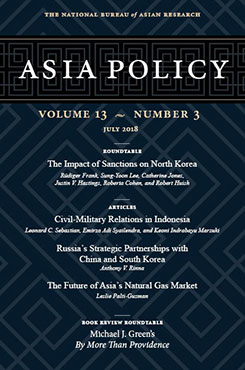Civil-Military Relations in Indonesia after the Reform Period
This article analyzes civil-military relations in Indonesia by examining the creeping renewal of military involvement in national policy implementation and the key drivers that contribute to this trend.
EXECUTIVE SUMMARY
MAIN ARGUMENT
For much of Indonesia’s post-independence history, the military has been the country’s dominant institution. After President Suharto’s New Order collapsed in 1998, the country introduced frameworks to strengthen oversight of the military, professionalize it, and make it accountable to civilian authority. However, President Joko Widodo and other national leaders have continued to employ political patronage toward high-ranking officers to strengthen their own power bases. Moreover, devolved authority, complex bureaucracy, and a lack of capacity often hinder the implementation of high-profile national policies at the local level. To address these shortcomings, leaders have turned to expanding the role of the military in policy implementation. At the same time, regulatory loopholes provide room for the government to lure the military out of the barracks and conversely allow the military to continue its nondefense engagement. This has given rise to a new civil-military relationship characterized by need-based and transactional fusionism, in which the military is equal rather than subordinate to civilian authority.
POLICY IMPLICATIONS
- Despite extensive reform efforts aimed at abolishing its traditional dual-function doctrine, the Indonesian military is experiencing a resurgence of involvement in nondefense areas.
- Considering that there is no clear oversight or legal framework to regulate military assistance in nondefense policies, there is a probability that the military will override civilian authority. In this way, the military may seek to dominate government institutions and policies that intersect with its security interests.
- Growing military involvement in nondefense policy in the form of need-based and transaction fusionism creates a dependency mentality and prolongs deficiencies in civilian institutions.
- There is a need to implement existing laws and introduce innovations in doctrine to reduce the propensity for the military to intervene in civilian affairs.


